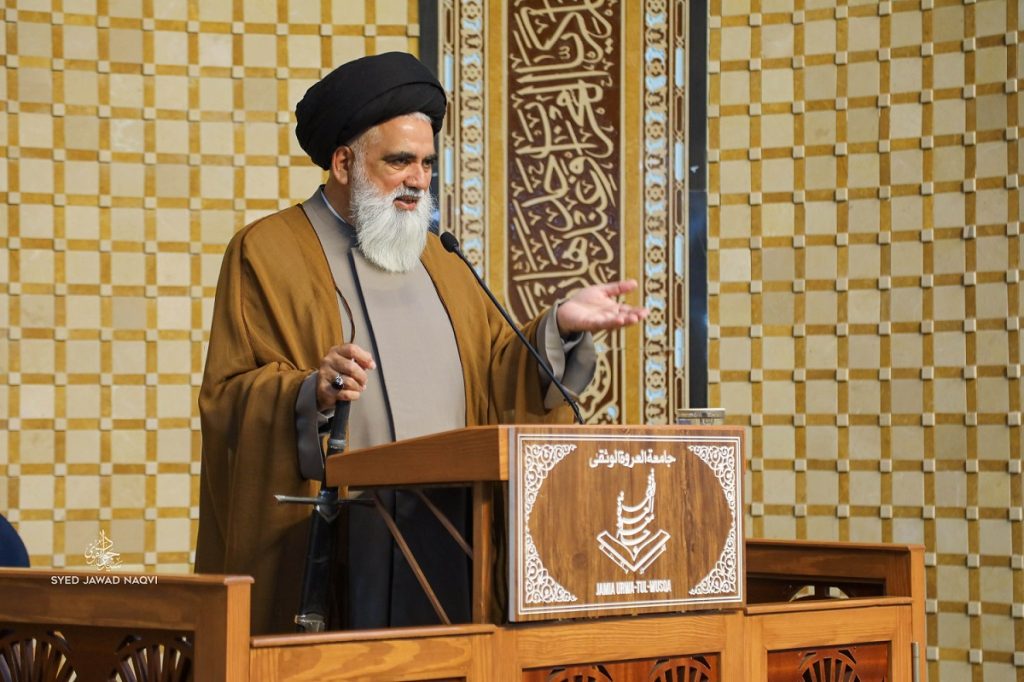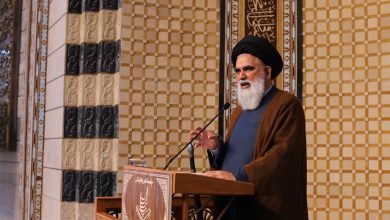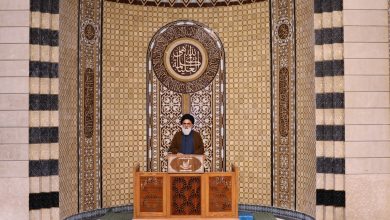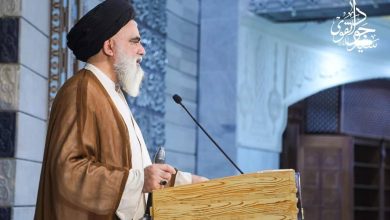Hujjatul Islam Ustad Syed Jawad Naqvi
(Principal Jamia Orwatul Wuthqa – Lahore)
Delivered at: Masjid Baitul ul Ateeq
Lahore – Pakistan
Friday Sermon 28th March – 2025
Sermon 1 : Proximity, Perfection and Protection – In the month of Ramadan
Sermon 2: Participation in Qods Day is the sign of acceptance of worship in Ramadan
وَوَفِّقْنَا فِيهِ لاِنْ نَصِلَ أَرْحَامَنَا بِالبِرِّ وَالصِّلَةِ
Give us success in this month to tighten our bonds of kin with devotion and gifts,
وَأَنْ نَتَعَاهَدَ جِيرَانَنَابِالاِفْضَالِ وَالْعَطِيَّةِ
attend to our neighbours with bestowal and giving,
وَأَنْ نُخَلِّصَ أَمْوَالَنَا مِنَ التَّبِعَاتِ،
rid our possessions from claims,
وَأَنْ نُطَهِّرَهَا بِإخْرَاجِ الزَّكَوَاتِ،
purify them through paying the alms,
وَأَنْ نُرَاجِعَ مَنْ هَاجَرَنَـا
go back to him who has gone far from us,
وَأَنْ نُنْصِفَ مَنْ ظَلَمَنَا
treat justly him who has wronged us,
وَأَنْ نُسَـالِمَ مَنْ عَادَانَا
make peace with him who shows enmity toward us
حَاشَا مَنْ عُودِيَ فِيْكَ وَلَكَ،
(except him who is regarded as an enemy in You and for You,
فَإنَّهُ الْعَدُوُّ الَّذِي لاَ نُوالِيهِ،
for he is the enemy whom we will not befriend,
وَالحِزْبُ الَّذِي لاَ نُصَافِيهِ.
the party whom we will not hold dear),
Imam Sajjad (a) has presented two supplications for Ramadan; one on advent of Ramadan and other on farewell. Imam says in this part of the supplication, to befriend and deal justly with our personal enemies.
وَأَنْ نَتَقَرَّبَ إلَيْكَ فِيْهِ مِنَ الأَعْمَالِ الزَّاكِيَةِ بِمَا تُطَهِّرُنا بِهِ مِنَ الذُّنُوبِ،
and seek nearness to You through blameless works which will purify us from sins
وَتَعْصِمُنَا فِيهِ مِمَّا نَسْتَأنِفُ مِنَ الْعُيُوبِ،
and preserve us from renewing faults,
حَتَّى لا يُورِدَ عَلَيْكَ أَحَدٌ مِنْ مَلاَئِكَتِكَ
so that none of Your angels will bring for You
إلاّ دُونَ مَا نُورِدُ مِنْ أَبْوابِ الطَّاعَةِ لَكَ، وَأَنْوَاعِ القُرْبَةِ إلَيْكَ.
the kinds of obedience and sorts of nearness-seeking unless they be less than what we bring!
Grant me the ability to engage in actions that draw us closer to You and help us cleanse ourselves from sins. This paragraph expresses three key ideas. The first is to perform actions that foster closeness to Allah. While we begin all our acts of worship with the intention of seeking Allah’s nearness (Qurb), we often fail to fully grasp what that closeness entails. There is one type of nearness that is physical, similar to being close to our relatives. Another is emotional proximity, characterized by affection and connection in our feelings. It is possible to live in close quarters with someone yet feel distant emotionally. As Imam Ali (علیہ السلام) remarked to the people of Kufa, they may be physically united but are far apart in their desires and priorities. There is also a nearness related to rank and status. For instance, an ordinary person may be near a scholar physically and even share a bond, but in terms of their respective positions, they are distant. In a classroom, a student and a teacher can be close and have affection for one another, yet the scholar possesses complete knowledge while the student remains far from that level of understanding. The student aims to become closer to the scholar, which might involve sitting near the teacher or seeking the teacher’s approval and guidance. Additionally, the student strives to grasp the teacher’s lessons, thereby reducing the intellectual gap over time, ultimately achieving a form of proximity.
The proximity to Allah (s) is not physical, as Allah does not possess a material existence. Allah is an essence that is omnipresent and encompasses everything. Allah declares, “I am close to you,” and whenever a servant seeks to find Him, He is near. Allah has dominion over the universe, and nothing is beyond His reach; however, in terms of rank, Allah represents absolute perfection, while man is inherently incomplete and deficient. Thus, individuals must work to overcome these deficiencies in pursuit of perfection, which can be achieved through servitude and worship. The qualities of perfection exist within man but often in a weak and deficient form. This weakness must be addressed to attain closeness to Allah.
The purpose of worship is often misconstrued as merely a laborer working for wages. A laborer building a wall does so without it affecting his ownership because he is motivated solely by payment. Similarly, we tend to view our worship as a transaction, where we expect rewards (Thawaab) as compensation. However, Allah has not established worship as a mere exchange for rewards; instead, the deeds themselves become integrated into our character. If these deeds lead to perfection, that perfection becomes a part of us. For example, when someone learns a skill from an expert, such as a mechanic, the trainee performs small tasks daily without financial compensation. The wages in this case are the skills and knowledge gained. Allah has commanded us to perform certain obligatory and recommended acts, which ultimately shape our personalities. Good deeds enhance our character, while bad deeds degrade us further.
In Arabic, “Hawa” refers to desires that lead a person to a lowly state. The actions we take influence our essence, either elevating us or degrading us. “Taqarrub” encompasses actions that cultivate perfection within us. The acts of proximity gradually foster this perfection. Imam Sajjad (علیہ السلام) encourages us to attain closeness to Allah (s) during this month through nurturing actions (Tazkiya). The term Tazkiya signifies nurturing abilities to reach perfection. How many should abstain from sins? If one is weak, they are prone to sin. To guard against sin, one must cultivate perfection. Just as we may struggle with a language due to lack of practice, resulting in mistakes, we must strengthen our skills to avoid errors. Eliminating mistakes equates to avoiding sins. Our worldly attachments stem from weakness; by addressing these weaknesses, we can achieve purity. The actions that purify and nurture perfection are amplified during Ramadan.
Additionally, specific deeds in Ramadan can render us Infallible (Ismat). The term Ismat denotes complete perfection. Theologians have interpreted Ismat in various ways, but it fundamentally represents protection for individuals. Ismat, Taqwa, and Hifazat all serve as forms of protection in different contexts. Imam (علیہ السلام) implores us to engage in actions that will safeguard us, ensuring we do not revert to past mistakes. At times, we feel remorse for our actions and vow to change, yet we find ourselves repeating them. This is often because we neglect the means that could prevent our return to sin. The pathways back to sin remain open, and we may only resolve in our minds not to return. Those with strong willpower can resist these open pathways; however, such individuals are rare. Generally, to prevent relapse, we must close off the routes back to sin.
Thus, Imam (علیہ السلام) is beseeching Allah to close the doors of sin for those who are weak, as open doors would lead them to return to their transgressions. Those who find the doors to sin closed are indeed granted a special blessing from Allah, which can also be regarded as a form of Ismat. He (علیہ السلام) implores Allah to provide him with the opportunity to engage in deeds that foster His proximity, purify the soul, perfect our character, and protect us from reverting to sin.
The following part of his supplication pertains to the Angels. We have elaborated on the topic of Angels in detail during our Quranic Tabyeen lectures; however, many believers today only rely on brief clips. Those seeking a deeper understanding of religion should engage seriously with these lectures. I have pointed out that the discussion of Angels began with the creation of man in the Quran when Allah informed the Angels of His intention to create a caliph on earth. The fact that the Angels were addressed indicates their significant role in matters related to mankind.
In examining the Quran, traditions, and sciences, it becomes evident that every action of humanity involves the participation of Angels. There is nothing in our lives that can be deemed purely personal without their involvement. Angels are the emissaries of Allah, governing the affairs of the universe. Every event in this world is executed through Angels, even down to the minutiae, such as a single drop of rain being brought by them. Our connection to Angels is profound, yet our knowledge of them remains limited. We should seek to understand and recognize these Angels who tirelessly work on our behalf. The Quran speaks about Angels with clarity, detailing their roles and contexts.
Unfortunately, many of us approach the Quran after hearing interpretations from speakers or snippets from clips. Students dedicate years to studying other texts before turning their attention to the Quran. In academic circles, Angels are often presented as entities beyond human reach. We may acknowledge their existence but believe we cannot engage with or perceive them. However, the Quran emphasizes the involvement of Angels in every aspect of our lives.
We are aware of two Angels assigned to record our deeds daily. Their reports are meticulously preserved and presented to us as they are. These Angels are with us constantly and do not rest. There are also Angels who deliver bounties and instructions from Allah, as well as those who report back to Him regarding humanity. Imam Sajjad (علیہ السلام) speaks of these Angels who convey reports to Allah concerning eight billion individuals each day.
Imam Sajjad (علیہ السلام) is invoking Allah to enable him to perform deeds in this month that bring him closer to Allah, perfect his character, and prevent him from returning to sin. He desires that when his report is presented to Allah by the Angels, it should be exemplary. He aims to engage in such acts that his report stands out as the best during Ramadan. While many will participate in the same rituals, such as Salaat, Imam Sajjad (علیہ السلام) aspires for the quality and spirit of his actions to be unparalleled, making his deeds the most admirable among all.
أللَّهُمَّ إنِّي أَسْأَلُكَ بِحَقِّ هَذَا الشَّهْرِ،
O God, I ask You by the right of this month
وَبِحَقِّ مَنْ تَعَبَّدَ لَكَ فِيهِ
and by the right of him who worships You within it
مِنِ ابْتِدَائِهِ إلَى وَقْتِ فَنَائِهِ
from its beginning to the time of its passing,
مِنْ مَلَك قَرَّبْتَهُ أَوْ نَبِيٍّ أَرْسَلْتَهُ
whether angel You hast brought nigh to You, prophet You hast sent,
أَوْ عَبْد صَالِح اخْتَصَصْتَهُ
or righteous servant You hast singled out,
أَنْ تُصَلِّيَ عَلَى مُحَمَّد وَآلِهِ،
that You bless Muhammad and his Household,
وَأَهِّلْنَا فِيهِ لِمَا وَعَدْتَ أَوْلِياءَكَ مِنْ كَرَامَتِكَ،
make us worthy of the generosity You hast promised Your friends,
وَأَوْجِبْ لَنَا فِيهِ مَا أَوْجَبْتَ لأِهْلِ الْمُبَالَغَةِ فِي طَاعَتِكَ،
make incumbent for us what You hast made incumbent for those who go to great lengths in obeying You,
وَاجْعَلْنَا فِي نَظْمِ مَنِ اسْتَحَقَّ الرَّفِيْعَ الأعْلَى بِرَحْمَتِكَ.
and place us in the ranks of those who deserve through Your mercy the highest elevation!
Then He (علیہ السلام) prays for the benefit of those individuals who have fulfilled their duties of servitude to You throughout the entire month. These include the Angels who are close to You, the Prophets whom You have sent for guidance, and the righteous individuals whom You have chosen as special. The first supplication is to send blessings upon Muhammad (صلی اللہ علیہ وآلہ وسلم) and his progeny.
Next, he asks Allah to enhance his abilities and potential during this month so that he may be counted among Your saints, those whom You have granted special privileges. He seeks guidance and means that will enable him to attain this esteemed status and requests to be placed among those who are worthy of Your greatest mercy (Rahmat).
SERMON 2
In the month of Ramadan, we observe “Sawm,” with the primary goal of attaining Taqwa. This implies practicing servitude in a manner that is safeguarded. Certain acts of worship have specified signs of acceptance or outcomes. For instance, the Quran states that if you wish to see the benefits of Salah, you should observe whether you are avoiding evils and indecencies. If both elements are lacking, then the Salah is rendered ineffective.
Similarly, Hajj is a comprehensive act of worship aimed at the rebirth of an individual. It rectifies deviations in one’s character, representing the transformative impact of Hajj. Zakat, which involves nurturing a person’s character, wealth, society, and systems, holds a similar significance. Khums is also a form of Zakat. Societies that implement these systems will flourish. Furthermore, there are other forms of worship whose effects validate their acceptance and righteousness.
In Ramadan, everything we do contributes to Taqwa. We must dispel the notion that the outcomes of our actions are external. Each of our deeds influences our character, fostering Taqwa during this month. Taqwa serves as protection for our selves, our character, our faith, and everything that requires safeguarding. We must seek this protection through Allah.
One significant sign of Taqwa, emphasized by our elders, is the attention drawn to the oppressed, particularly the Palestinians, during this month. It has been forty-six years since Quds Day was established. The great leader Imam Khomeini (r.a) identified a profound wound in the body of the Muslim Ummah and mobilized people to support the Palestinians. The Muslim rulers, in their betrayal, sold Palestine to Britain, dismantled the Ottoman Empire, and divided the region among themselves, engaging in treachery that left Palestine vulnerable to Zionist control. Over time, additional Muslim lands also fell under Israeli occupation. Those rulers who publicly championed Palestine were, in reality, contributing to its downfall, strengthening their own power by capitulating to the Zionists.
When the revolution began in Iran, these rulers were also allies of the Zionists, with Iran and Turkey being among the first to recognize Israel. Imam Khomeini (r.a) reclaimed the Palestinian cause from these rulers and entrusted it to the Ummah and the Ulama. Over the past forty-six years, the Muslim Ummah and the Ulama have mirrored the actions of these rulers. The liberation movement of Palestine commenced, with Quds Day being announced on the last Friday of Ramadan. Some nations organized events, while others remained silent. Pakistani youth participate in Quds Day activities, yet the significance of this day is often overlooked by both scholars and the general public. I recall my first experience at a Quds rally, feeling disheartened because it was held in a city filled with scholars, religious organizations, and mosques. The preacher at the mosque from which the rally began told the police that they had no connection to the event. Approximately two thousand individuals left the mosque without participating in the rally. The Ahle Sunnah community in Pakistan has often felt disconnected from the Palestinian cause. The betrayal by rulers, the silence of the populace, and the negligence of scholars have all contributed to the situation we see today, particularly since October 7th, 2024. The ongoing war in Gaza is a direct consequence of this betrayal, resulting in over 50,000 martyrs and countless wounded, all suffering from relentless oppression.
A fundamental sign of Taqwa is the development of empathy for the oppressed. Through fasting, we are meant to cultivate compassion for the hungry and thirsty. Fasting was instituted to evoke these feelings, yet, paradoxically, many fasting individuals have shown a lack of mercy. The conflict has reignited, with ongoing attacks even today, met with complete silence. Allah has granted believers the privilege of fasting, which awakens and sustains their compassion. You have raised the banner of Quds, and it will remain in your hands until the liberation of Quds. Consider this your most cherished act of worship. Today, raising your voice for Palestine and Quds is among the best forms of worship. Those who have sacrificed their lives, including members of Hamas, Hezbollah, and Iran, have not failed. The true failures are those who have not made any effort, as Allah does not waste the efforts of anyone, and results will manifest. The sacrifices of Hamas and Hezbollah will yield outcomes. The cries of Palestinian women and the martyrdom of children will lead to change. In this heated environment, your voices raised on the streets of Lahore will bear fruit. We are committed to obeying Allah, our Imams, and our leaders. Karbala serves as the ultimate measure of success and failure; the martyrs were victorious, and we must not lose hope. Allah will grant victory to Palestine, and those who oppress will face destruction. We must remain steadfast in this struggle, even if only one person stands firm. With Imam Hussain (علیہ السلام) as our leader, we need not concern ourselves with who supports us or not. If the people of Karbala reached their destination, then we too must strive to do the same. We need to send this message from Pakistan to the world and to the oppressed: we stand with you and are prepared for every challenge. The more organized we are, the more impactful our message will be.






Reading your post is like a journey through a picturesque landscape of thought – full of color, depth, and light! If you ever decide to publish a book, you’ll surely find a devoted audience waiting for it!